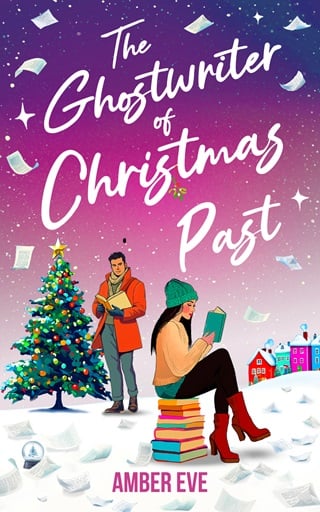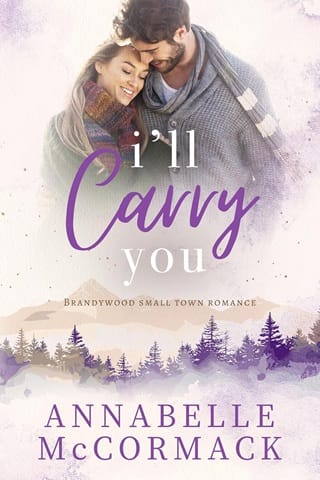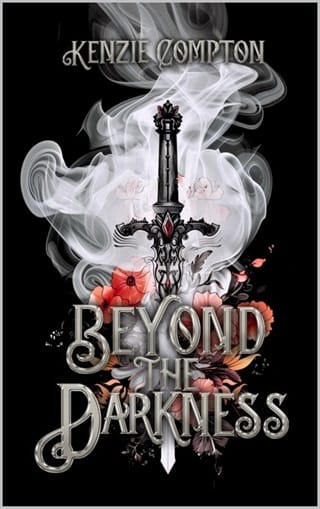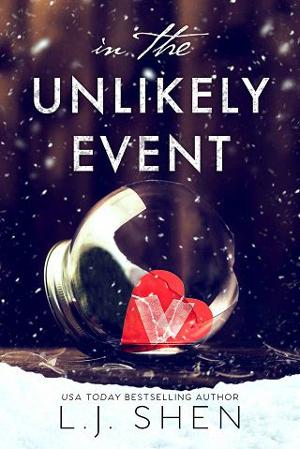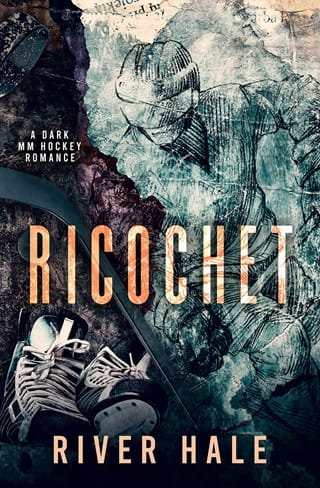8. Eight
8
PAST
DECEMBER, 10 YEARS AGO
W hen I wake up next to Elliot Sinclair the morning after our first date, and first dance, I have three thoughts in quick succession.
The first is that I never, ever do things like this. I do not crash pensioner dance parties with virtual strangers, no matter how handsome they are, or how much their accent makes me feel like the leading lady in the movie of my life. I do not spontaneously agree to go back with them to their slightly dodgy hotel room, above a pub. And I definitely do not sleep with them on the first date. Nuh-uh.
The second thought is that I really hope Dad hasn’t called the police and reported me missing, because, well, see above: I never do things like this. No, really: I don’t. I’m good ol’ sensible, reliable Holly: the daughter you never have to worry about, because she’s so scared of seeing that look on your face again — the one you didn’t know you were making when we realized Mum was dying and we were going to have to spend the rest of our lives without her — that she never puts a single foot wrong.
The third thought, though, is different. The third thought is I bet this is the first and last time this ever happens , and it’s quickly followed by a fourth thought, which is I don’t want it to be .
(There is a fifth thought, too, and it’s that The Rose Tavern is every bit as grim on the inside as it looks from the outside. Elliot’s room has a rusty old sink in the corner — presumably to make up for the lack of an en suite — and the tobacco-yellow walls have been painted only three-quarters of the way up, as if whoever did the job couldn’t find a ladder high enough to reach all the way to the ceiling. But, right now, I don’t care about any of that.)
“Good morning.”
Elliot smiles up at me sleepily from the pillow, his arms already reaching for me. Thanks to him, I don’t have any more thoughts for quite some time. Later, though, once I’ve texted Dad to let him know I’m fine, and he’s not to worry about me, another thought occurs to me.
“Tell me more about this book you’re thinking of writing,” I say, propping my chin on my hands as I look at Elliot across the slightly threadbare pillows. “Do you think you’ll actually do it?”
By way of answer, he jumps up and crosses the room to where a battered leather holdall is sitting on top of the equally battered wooden dresser. He rummages inside the bag, then leaps back onto the bed, hanging me a thick cardboard folio stuffed with loose leaf paper.
“ Chapter One … “I read, pulling out the first page, then lowering it so I can look at him over the top. “Oh my God, Elliot,” I squeal, scanning the closely typed words. “You’re not just thinking about it; you’ve actually done it!”
“Well, not quite.” He chuckles self-deprecatingly. “I’ve made a start on it. What you’re holding there is the first four chapters. I wrote most of it when I was back home, but I wanted to bring it with me, so I could read over it. There’s quite a few things I need to check. And it’s —”
He frowns, a small crease appearing between his dark eyebrows.
“I feel like there’s something missing with it,” he tells me. “I’m just not sure what it is, yet. I was hoping coming here, to Bramblebury, would help me figure out what it is. This is where it’s set, you know? I figured I should probably see the place if I’m going to write about it.”
“Sure.” I lie back down, snuggling into his side again as I scan the pages in my hand. “And it’s about your great-grandfather?”
“Yeah. Well, it’s based on what I know about his time here during the war,” he replies. “Which isn’t a lot, to be fair. So it’s mostly fiction, really. I liked the idea of it, though; you know, the American in England, the fish out of water. Which I assume he must have been; at least at first. Although he did make friends here. I have photos of some of them, actually…”
He throws the covers back and bounds out of bed again, rummaging through the bag until he finds what he’s looking for; a small leather wallet, from which he produces a handful of photos.
“Here you go,” he says, rejoining me. “Most of these seem to have been taken at the army base, but there’s one or two I think might have been taken here…”
I flick carefully through the photos, which are fragile and yellowed with age. Elliot’s great-grandfather looks back at me; a solemn-eyed young man with Elliot’s curly dark hair, who looks impossibly young to have been sent away from home to serve in some faraway war.
My heart contracts with pity for him.
“It’s okay,” says Elliot, watching me. “He came home. He was almost 90 when he died.”
“That’s good to know,” I reply, grateful to him for having read my mind. “You know how much I appreciate a happy ending.”
The next photo is the one Elliot thought might have been taken here in Bramblebury. I recognize the village square right away, although there’s no war memorial — obviously — and the sepia-tinted streets surrounding the square look oddly bare without the various trees and shrubs that have grown up since this was taken.
The photo is one of those ones taken by a street photographer. I remember Mum showing me some similar shots of her own relatives. Most people couldn’t afford cameras in those days, she’d explained. So professional photographers would hang out in busy streets and snap photos of the passers-by, which they’d then try to sell to them. Most of them probably bought them, too; for some, they might have been some of the only photos they had of themselves.
In the photo in my hand, Elliot’s great-grandfather is striding through the square, wearing a US Army uniform (Or I assume that’s what it is), and with a huge smile on his face. And no wonder he’s smiling, because on one arm, there’s a young woman, her head tilted back as she looks up at him, as if she’s hanging on his every word.
The woman is in uniform too, although I don’t know enough about the era to know what kind. But she wears a smart skirt and matching jacket, with sensible looking shoes and a peaked hat. The photo is so old and faded that a lot of the detail has been lost, but she has a pretty, heart-shaped face, and dark, arched eyebrows, like a movie star.
“I’m guessing this isn’t the great-grandma from Boca Raton, then?” I say, passing the photo back to Elliot, and moving on to the next one, in which the same woman poses in front of a Christmas tree, wearing a thick wool coat with a swishy skirt, which makes me wonder why people stopped dressing so well.
“Nope. They didn’t meet until after the war. I don’t know who this woman is, actually. As far as I can gather, he never mentioned a girlfriend — if that’s what she was.”
“Oh, I’d say that’s definitely what she was,” I reply, my curiosity piqued by the young couple who look so happy in their photo together, but who were doomed to spend the rest of their lives apart. “I wonder who she was? And what happened to her after the war?”
I wonder what happened to her after he left her , is what I really want to say here. Because he must have done, given the little Elliot knows about the man in the photo. We know he went back to America. We know he married someone else. And now Elliot wants to write his story, but all I can think about is hers .
I flick quickly through the rest of the photos, finding two more of the movie star woman tucked in among shots of the village. She’s beautiful, whoever she is.
I wonder what her story is?
“Can I read this?” I ask, picking up Elliot’s manuscript and leafing through the pages.
“I thought you’d never ask,” he says with a grin. “Of course you can. I’d be honored. Maybe you can help me figure out where I’m going wrong with it. That missing piece of the puzzle.”
“Oh, I’m not sure about that,” I reply. “I just read books. Well, and sell them. I don’t know anything about writing them.”
“Well, that makes two of us, then,” he says lightly, taking the pages from me and throwing them onto the table by the bed. “Anyway, we can talk about the book later. Right now, I’ve got other plans for us…”
We spend the rest of the morning lying curled around each other in the lumpy little hotel bed, watching the snow fall lazily outside the window.
“This is so nice,” I say, as the light starts to fade, and we still haven’t left the room. “ You’re so nice.”
“Okay,” Elliot replies, propping himself up on one elbow to look me in the eye. “That’s the second time you’ve called me ‘nice’ now. I’m going to have to beg you to stop.”
He leans forward and kisses me lightly on the lips, to show me he’s not being entirely serious.
“Why? What’s wrong with being nice?” I ask, after the kiss has gone on for much longer than he probably intended. “Don’t you want to be nice?”
“Nope,” he says firmly, shaking his head. “Nuh-uh. ‘Nice’ is one of the most insipid words in the English language. I’d rather be almost anything else. I want to be… brave. Stupid. Crazy. Magnificent. But not ‘nice’. No one ever remembers ‘nice’. And, anyway, the nice guy is never the one that gets the girl, is he?”
“I don’t know about that,” I reply, grinning. “You seem to be doing okay so far. But I get what you mean. For me it’s ‘sensible’. Or ‘hard worker’. People are always telling me I ‘try really hard’ or I’m ‘such a hard worker’. Which is fine , but… well, it’s not the same as saying I’m good at whatever it is I’m ‘trying hard’ at, is it? And no one ever remembers the person who tried hard , either — they just remember the one who succeeded. Or who failed spectacularly . No one remembers ordinary.”
“You’re anything but ‘ordinary’, Holly Hart,” Elliot says softly, tracing the contours of my lips softly with his finger. “I know I’ll remember you.”
And there it is: the subject we’ve yet to broach. The one we’ve been carefully avoiding ever since we met. The one where he goes back to America — soon, maybe? — and all of this becomes just another memory.
Until now, we’ve avoided talking about it at all. But now he’s put it out there; which means there’s no point continuing to pretend we’re at the start of something when we’re already at the end.
“I’ll remember you too,” I reply, swallowing down the lump that’s risen in my throat. “When you go home. When do you go home?”
“My flight leaves the day before Christmas,” he says, not looking at me. “My Mom made me promise I’d be back for Christmas Day.”
I nod, mentally adding another reason to hate Christmas to my already long list.
“But look,” he says, brushing the hair back from my face so he can look into my eyes. “Let’s not think about that for now, okay? Let’s just enjoy each other’s company. Let’s just … well, live for the moment, I suppose.” He grins. “What d’you say?”
I hesitate.
I should say no to this. I should get up and leave, with my heart still intact. Because I know beyond doubt now that this isn’t going anywhere. No matter how much I like him, there’s no future for me and Elliot Sinclair; and the knowledge of that already hurts more than it should, given the short time we’ve known each other. If I spend more time with him, though, it’s only going to make it worse.
I should protect myself from the hurt I know is in store if I let this go on. I should say goodbye now, and let the last 24 hours just be a beautiful memory that will fade with time, until I’m not totally sure it even happened, or if I just dreamed it.
But then I think of Mum.
I think about how you never really know when it’s going to be the last time you do something — or say something, or see someone. You don’t know until it’s too late, and there’s no time left to do all the things you planned when you thought you still had time.
But with Elliot, I do know. I know exactly how much time we’re going to have. I know exactly when it will end. And the fact that this … whatever this is … between us now has an end date — December 24th, to be exact — makes it feel all the more important that we try to make the most of what little time we have.
The thought is an oddly exciting one. Because, the fact is, I’m not the kind of person to seize the day, or take risks. No, I’m the kind of person who reads the ends of books before the start, to make sure they’re not going to hurt her. The kind of person who recently started arranging the books on the shelves in the store by color, rather than alphabetically, after seeing someone do it like that online. Dad says it’s “an absolute nonsense” which makes it impossible to find anything, but something about it makes me feel calm and in control, as if I really am making order out of chaos. And if I can do that; if I can just control the chaos, and make everything around me feel perfect , then maybe I can finally feel safe.
But I’m not safe, am I?
Losing Mum showed me that.
And although I’ve never been the type to take risks, I’m starting to think maybe I should take a risk with Elliot Sinclair. That maybe it would be worth it. That I’m 24 years old, and have spent my entire life standing still; and maybe it’s time to change that? To do exactly as Elliot says, and ‘live for the moment’ for once, as cheesy as that sounds.
Ever since Mum died, I’ve always dreaded winter; the season we lost her. But maybe this winter could be different. Better. Warmer. Maybe things could change. Maybe I could change; or I could try , anyway. And if I fail, I could at least fail spectacularly.
“Christmas Eve,” I say thoughtfully, snuggling back into Elliot’s arms. “That gives us almost 23 days. It’s not a lot of time, really.”
“Oh, you can do a lot in 23 days,” Elliot assures me, dropping a kiss on top of my head. “Trust me.”
I tilt my head back to look up and into those beautiful blue eyes of his.
“Okay,” I tell him, a sudden rush of adrenaline making me feel like this might just be the best idea I’ve ever had. “Okay, I trust you. “
And I did.
But I really shouldn’t have, should I?
 Fullepub
Fullepub 